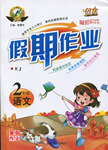题目内容
___________the rough weather and traffic, rescue teams and relief supplies have managed to reach the quake-stricken area.
| A.Due to | B.In spite of | C.As a result of | D.In terms of |
B
解析

 鸿图图书寒假作业假期作业吉林大学出版社系列答案
鸿图图书寒假作业假期作业吉林大学出版社系列答案
| |||||||||||||||||||||||||||||||||||||||||||||||||||||||||||
完形填空 (共20小题;每小题1分,满分20分)
阅读下面短文,从短文后各题所给的四个选项(A、B、C和D)中,可以填入空白处的最佳选项,并在答题卡上将该项涂黑。
Although my father wasn't a doctor, he made his own brand of "house calls". I followed him as he 36 a plate of my mother's home cooking to an elderly man named Frank 37 all major holidays, and when Frank was 38 . As far as I know, their only 39 was that Frank was an occasional 40 at Dad's small gas station. Frank's home was a two-room house on the rough side of town with a rotten front porch(门廊) that you could fall through if you weren't 41 . Through his caring 42 , my father was teaching me to be a doctor, 43 neither of us knew it at the time.
When I was 13, my father 44 lung cancer. He brought home a 45 the doctor drew showing 46 his cancer was and told me that he was going to 47 .
The big green oxygen tank with plastic tubing 48 a central feature (特征) of our living room next to his easy chair. Several months passed and his condition 49 . He asked me to 50 my mother when he was gone. He said, "I love you, son." That night he died.
When you're 13 and your father dies, you have some 51 to make. You can use the circumstance as a (n) 52 for letting your behavior and grades go down drain, or you can honor his memory and try to do something 53 with yourself. I 54 my energy on my school work and my goal of becoming a 55 . .
| 【小题1】 |
|
| 【小题2】 |
|
| 【小题3】 |
|
| 【小题4】 |
|
| 【小题5】 |
|
| 【小题6】 |
|
| 【小题7】 |
|
| 【小题8】 |
|
| 【小题9】 |
|
| 【小题10】 |
|
| 【小题11】 |
|
| 【小题12】 |
|
| 【小题13】 |
|
| 【小题14】 |
|
| 【小题15】 |
|
| 【小题16】 |
|
| 【小题17】 |
|
| 【小题18】 |
|
| 【小题19】 |
|
| 【小题20】 |
|